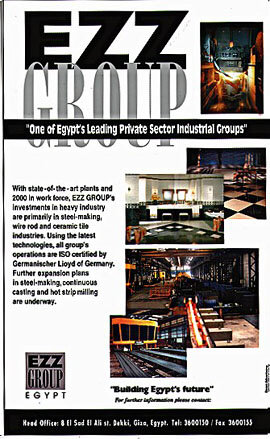
 Strategy Strategy
 What’s Ezz Group? What’s Ezz Group?
It’s steel
It’s ceramics
And it’s commitment to preparing Egypt’s most highly trained workforce.
Ezz industries have been the major leader driving private sector growth in Egypt
 2/Corporate Profile 2/Corporate Profile
Under the leadership of innovative entrepreneur, the Ezz Group has grown
from a steel importer in the 50’s to one of the largest producers of
steel and ceramics in the Middle East. Its commitment to growth has been
key to industrial leadership.
 CERAMICS CERAMICS
In 1988 the Ezz Ceramics company was founded, producing tiles under the brand name Gemma. It started with one million square meters of production. Now Gemma is supplying customers more than 12 million square meters of Ceramics and growing.
Gemma produces ceramic and porcelain tiles for both commercial and home use.
A new production line manufacturing high quality porcelain tiles was recently
established to satisfy demand from Egypt’s growing upscale market. Many of Cairo’s
new, modern high rise luxury apartment complexes use Gemma ceramics for both
their practical and aesthetic quality. The state-of-the-art production facility
in Sadat City, an industrial zone northwest of Cairo, is equipped with the
most up-to-date technology. Gemma is a fully integrated production facility,
from the raw materials to final production. Gemma has been ISO 9001 certified
since 1995.
Gemma is the ceramic and porcelain of choice in Egypt and a growing name in more than 50 countries around the world where the product is exported to.
 STEEL STEEL
Ezz Steel, on the other hand, has emerged in just a few short years as one
of Egypt’s leading steel producers, currently supplying 1.1 million tons
of steel per year. Ezz made the decision to move into steel production in 1993
by acquiring and upgrading an existing rebar and coil facility in the 10th
of Ramadan city, east of Cairo. In two years Ezz exceeded the original design
capacity by 36%, yielding 300k tons of steel products per year. In five years,
Ezz built two rolling mills producing 800k tons of rebars a year in a complex
in Sadat city. They are the new generation of 21st century steel plants:
- High level of automation
- Environmentally friendly
- State of the art technology
- High tech
Ezz steel has been ISO 9002 certified since 1997. The company also has
14001 certification for its environmental management system.
 Ongoing Projects Ongoing Projects
In April 1998, after only 18 months of construction, the latest Western designed,
state of the art electric furnace (meltshop) was on line producing more than
750k tons of billets. Danieli of Italy, one of the world’s leading suppliers of steel technology, built the plant, with future additions expected to be finished by the turn of the century. Ezz will then produce 2 million tons of long bar products including 1.5 million tons of rebars and 500k tons of sections. This will make Ezz steel the market leader for long products in Egypt. Already, Ezz steel is used in most of the country’s
large construction projects including the Cairo subway, bridges, ports, new
urban and touristic development projects etc.
On land fringing the Gulf of Suez, East Cairo, Ezz is taking part in one
of Egypt’s most ambitious development projects: The Gulf of Suez Development Project. Ezz has started breaking ground for a new flat products plant in which Danieli has taken an equity stake as well as acting as a technology supplier. The plant’s
innovative design is one continuous process from steel melt to rolling of
flat sheets, ultimately yielding 1.2 million tons of product.
40% of Ezz steel is poised to provide flat steel to Egypt’s 12 auto
assembly plants and numerous durable goods manufacturers while the remaining
60% will
be exported. Already 3 off-take export agreements have been signed, 2 with
international trading houses and a 3rd with a pipe producer. The flat sheet
plant is a 750 million dollar project financed in part by guarantees by the
Italian Export Credit Agency (SACE). Confidence in Ezz Group has made this
project possible. It is the largest private sector investment in Egypt to
date.
By the turn of the century Ezz will be the largest producer of reinforcing steel bars and a leader in the flat products market with a total production capacity of 3.2 million tons p.a.
 Ezz Group is growing through: Ezz Group is growing through:
Innovation
Commitment to quality
Highly trained workforce
World class products
 Major projects using EZZ steel: Major projects using EZZ steel:
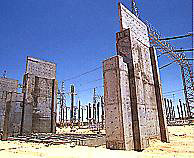
Taba power station
(Contractor : Kolaly For
Engeniering Works Co.)
|
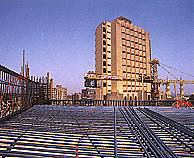
Conrad International Hotel
(Contractor : Orascom - BE Six)
|
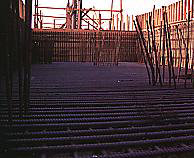
El Salam Pump Station N°4
Sahl El Tina - Sinai
(Contractor : Egyption Contractors Co.)
|
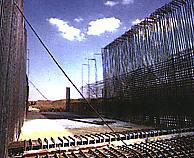
26th July Bridge Extension
(Contractor : Egyption Contractors Co.)
|
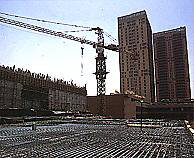
Al Aszhar Shkeikhdom Building
(Contractor : Atlas Contracting Co.)
|
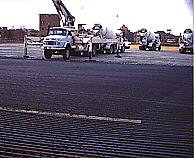
Ring Road - Sector 2 (Basatin)
(Contractor : Wadi Kom Ombo Co.) |
INTERVIEW WITH
Mr. AHMED EZZ
CHAIRMAN OF EZZ GROUP
MONDAY 7 DECEMBER 1998
1/Q: Mr. Ezz, you began your activities as a trading company in the
1950s. Since then the group has diversified and operates in different fields of activities. Today, you are one of Egypt’s leading steel producers. Could you give our readers a background of the group today?
The company started in the 1950s in steel trading and trading of construction materials. Then it expanded in the 1970s in the international trade of steel as well as ship owning. Then we diversified into industry in the 1980s. First, we invested in setting up ceramic tiles manufacturing facilities in the late 80s and then in 1990 we invested in our first rolling mill. Growth continued in both of these sectors, ceramic tiles and steel, throughout the 90s. Now, we became quite a large producer of steel and one of the largest producers of ceramic tiles in the Middle East. It is still also one of the largest steel producers in the Middle East. So, the total turnover in steel, building and construction material in general is close to $470 million. We employ 2200 people. Our total investment in plants, equipment and fixed assets exceeds $600 million. We continue to have a very positive view of Egypt and its economy. We are currently investing in a joint venture with European partners. We are building the first modern flat steel product facility in Suez, which is an investment of $620 million that will be completed by the year 2002. It will produce one million tons of steel with the new technology that has been invested and tried by new core of the United States. In addition, we lead the effort and we are the core investor of the Gulf of Suez Development Company (GSDC), which is a company that aims to develop 20 square km of land of the North West of the Gulf of Suez. The purpose is to develop the infrastructure and the facilities and services in this area, hopefully to try to promote direct investment in manufacturing by multinational companies in this area.
|
2/Q: The demand of steel is increasing by 7% a year in Egypt, fueled by a boom in the construction sector. What is your policy to face such an increasing demand and to maintain your market share?
In the construction steel we have a 27% market share. We want, at least, to maintain that level. We also want to acquire a larger market share. We are hoping to reach 40% in the next 5 years. In addition to the new facility, we are investing in Suez. We are also expanding our current facilities to reach 2 million tons of long products from the current 1.1 million tons. Construction is already taking place in our current facilities to expand them to reach that level. By 2001, we will have reached 3 million tons that will give a turnover close to one billion dollars from steel. It will make us the largest private sector company in steel in the Arab world with this turnover. I am talking about the private sector. State-owned companies may be larger in the Arab world.
-Is your company undergoing a process of specialization or diversification in this area?
What we are basically doing is that we are heavily investing on the quality of people, in training people and creating the know-why and not only the know-how. So, we are basically investing in our technological capabilities, which is a phase that many industries in the developing world go through. In the beginning you are interested in developing your operational capabilities. Once you find that you are comfortable with that, you have these efficiencies in your operational capabilities, you then want to develop your technological capabilities. That means that you are able to deal with changes and with innovations on your own without having to reinvest and totally dependent on an international supplier of technology or engineering. That is one thing that we are interested in and we hope that it will give us the edge. The second thing that we are doing is that we have always taken the long-term view and invested in state of the art technology and in environmental compliance systems that we feel will give us the edge. The last thing is that we are very much market driven. Improving our management also drives us. So, we move very fast with the market. We are very close to our customers. Moreover, we have tried over the years to develop quite an aggressive and modern management system starting from being automated in all our operations and being very close to consultants like Arthur Anderson, trying to keep us quite slim and efficient. We are focused on steel and heavy industry. We are not over diversified, as it is the case with some of the larger groups in the developing countries in general. We try to have a core competence and we focus very much on that.
3/Q: You are the Chairman of the Gulf of Suez Development Company for the development of the Suez project. Competition will be extremely hard. How do you foresee this competition?
I think that competition is good but first I would like to talk about the whole area. It is probably one of the most strategically located development zones. I am talking about the whole 90 kilometers of land. The other thing is that a world-class infrastructure is being built in that area within a public-private partnership where the government has certain obligations that it is fulfilling very quickly and the private sector has other obligations in terms of building infrastructure. It is going to be designed and built according to a world class level that is going to make it very attractive. The third factor is that a very important port is presently being built up. It is a very modern port. There are views to have the port managed by international operators. This could be new in Egypt. The area is at the crossroads of major energy links. In Suez, there is plenty of gas with plentiful electricity. That again makes it very important and it is very close to the industrial base of Suez and a reservoir of human resources that exist in Suez. So, this makes it a very good area for investment and also that, for the first time, a world class infrastructure, is available and managed by the private sector and highly supported by the government, will probably lay out in better terms to the international investor all of the incentives that exist in Egypt. There are very good incentives for investment in Egypt. So, basically the background for all that is very good. As for the competition there, I think that there are some advantages and some disadvantages for it. It is good in the sense that there are a lot of shared facilities that the companies investing in Suez are going to co-invest in, probably in waste water treatment and solid waste management. The competition is making us move very fast. I do not think that we would be where we are today had there not been this competition.
-What are you doing in order to attract future investors to YOUR allocated space?
We are using world class consultants. So far we have worked with Bool Allen & Hamilton and others to make a survey on multinational companies. The design is derived by a very important survey that has been conducted by all existing special zones in the world and on the perceptions of 50 multinational companies in one-on-one interviews. The topics covered included what quality and details of infrastructure that these companies required and what are the basic industries that they would like to invest in. This has driven the detailed engineering that we are going through now, basically to be a provider of all these requirements from the very first day. W.S. Atkins performs engineering.
-So, you are looking for specific investments?
Yes. We are looking for investments in the petrochemical industries and basically in all energy-intensive industries because the energy is available. We are also looking for export-oriented industries where bulk transportation is a requirement and that is because of the immediate vicinity to a very important deep sea port that is being built today. We also consider that investment in auto parts is quite attractive in that area. We also look for investment in consumer electronics, household appliances, and the auto industry in general. These are the areas that we consider the Gulf of Suez Development Company is suited to attract investment in.
-Are there any American interests?
We are talking with some U.S and Korean companies and European companies as well as we develop our engineering. We are in a position to present the whole theme to them. We think that we will have the first success in the first couple of months. This is very important because we need one story to tell to be able to attract other potential investors. We are very close to doing that.
4/Q: Egypt and the USA agreed on a partnership for economic growth and development. You have been chosen to be among the President’s Council. Could you tell us your opinion on how this partnership can affect the Egyptian economy?
It is already affecting the American economy because some very important exports from the States like grain, equipment and technology are taking place in Egypt. So, I think that this partnership is positive to the United States. It can be very positive for Egypt if, over time, we are able to attract direct investment by U.S companies which is something that is welcomed by the entire business community in Egypt. It will also be positive if we are able to export more to the United States, which is the largest market in the world. It is important if we can have more technology transfer by U.S. companies in Egypt. Basically, the whole interest is to increase trade and investment. We have already seen some investment and portfolio investment in our capital market in the past three years. We have seen more interest by institution investors
(American investors) in Egyptian companies. Perhaps, the emerging market meltdown affected the perceptions although Egypt is outside the whole drama that has unfolded. This will continue because we have a capital market that is more efficient and more attractive in the long run. We would really like to see these foreign direct investments. We have a good example of how that investment can be successful and that is General Motors in Egypt. They are a good company that has provided a world class product and served its customers in Egypt well. There are some important investments in the oil and gas industries by U.S. companies. Xerox is another company that invested in Egypt and has created value. These are some examples but we need to see more. Egypt is a very good base for any company wishing to be a regional player or even producing for its very low cast and its good factor cost, it can really be a hub in a global supply chain of any U.S. manufactures. Besides, U.S. companies, in the years to come, will make use of a growing local Egyptian market with a rising per capita income. We are very positive where the growth of the economy is concerned. We are also positive on that growth being sustainable in the medium and long term. So, we see Egypt providing that opportunity even as a local market.
5/Q: What should be done to attract more investments into Egypt?
I think that one of the positive matters is that the private sector has started to run more and build industrial parks. In addition, we all have to be more active in making it known to U.S investors that Egypt is there and is open for business and provides very good opportunities for business. American investors have different perceptions on Egypt and these perceptions need to be changed. There is always a misunderstanding of the industrial base in Egypt and the capabilities of the people here, the quality of education, the quality of the infrastructure and how stable Egypt in fact is and how secure Egypt is. We need, as a business community, to put more effort in promoting Egypt to U.S. investors. They know very little about Egypt and that needs to be changed.
6/Q: Mr. Ezz, you managed to become one of the nation’s largest private industrial conglomerates. What is your secret?
The people are my secret. The most important thing is investing in people and believing in the quality of the people and to bring them up to a world class standard of middle management. I think that this was one of the reasons for our relative competitiveness and our being to move forward very fast. One of the things that we do is that we have a program in investing in MBAs. We send a lot of our middle management on two-year sabbaticals to get their MBAs from some of the best business schools. We invest heavily in training our technical people. The other reason for our success is that we believed early on in the strength of the economy and in the opportunities provided by this Egyptian growth. So, earlier on we took risks and invested in larger plants and more modern facilities and environmentally friendly facilities. We invested in a scale of industries that was beyond what the private sector was contemplating eight or nine years ago. We were well positioned to benefit from the growth that we are seeing now in the economy. The last thing is that we have chosen the [--] of very modern production facilities. We believed in the capabilities of the people here and the systems to deal with the cutting edge technology that existed at any point in time. These are the three factors that were very important as we invested in our plants. As in terms of being able to operate them and move these companies effectively, we have always looked carefully at the market, responded very well to the market. We put our customer’s needs at the top even in situations when competition was not as strong as it is today we took a longer term view of keeping our customers satisfied which is something that is not usually done if you are in a stronger position than your customer. I think that all these factors served together.
7/Q: Regarding the ceramics sector (Al Ezz Group under the brand name of Gemma & Gevhari), your production has notably increased (1 million in 1990 to 12 million square meters). You control over 20% of the market. What is your strategy to maintain or increase your market penetration?
Our strategy is to grow in the industry. The next step is to continue our track in investing in steel. We continue maintaining our market share in ceramic tiles with a very clear strategy of exporting our ceramic tiles that have proven to be successful this year. We are the quality producer of ceramic tiles in Egypt and the market perceives us as such. We have a mix of continued product development and a good advertising and branding as well as a focus on quality. Ceramic tiles have especially brought us to that situation but we will continue to expand and meet an increasing demand, locally and regionally. We are also seeing our first export success outside of Egypt. Looking at the German market and Europe in general and the Middle East we see a potential growth there. The other venue that we are considering at the moment is the petrochemical industry. We are seriously looking at possibilities to expand there and maybe some U.S. companies can show interest.
8/Q: What will be your final message to our readers?
My final message to them is that for many years while the Asian Tigers occupied the headlines of your magazines and other financial newspapers and economists debated the so-called Asian boom, Egypt has been working very hard. In Egypt, we believe that our brand of development is worth waiting for. If tigers could emigrate the banks of the Nile would be high on the list of destinations. |

